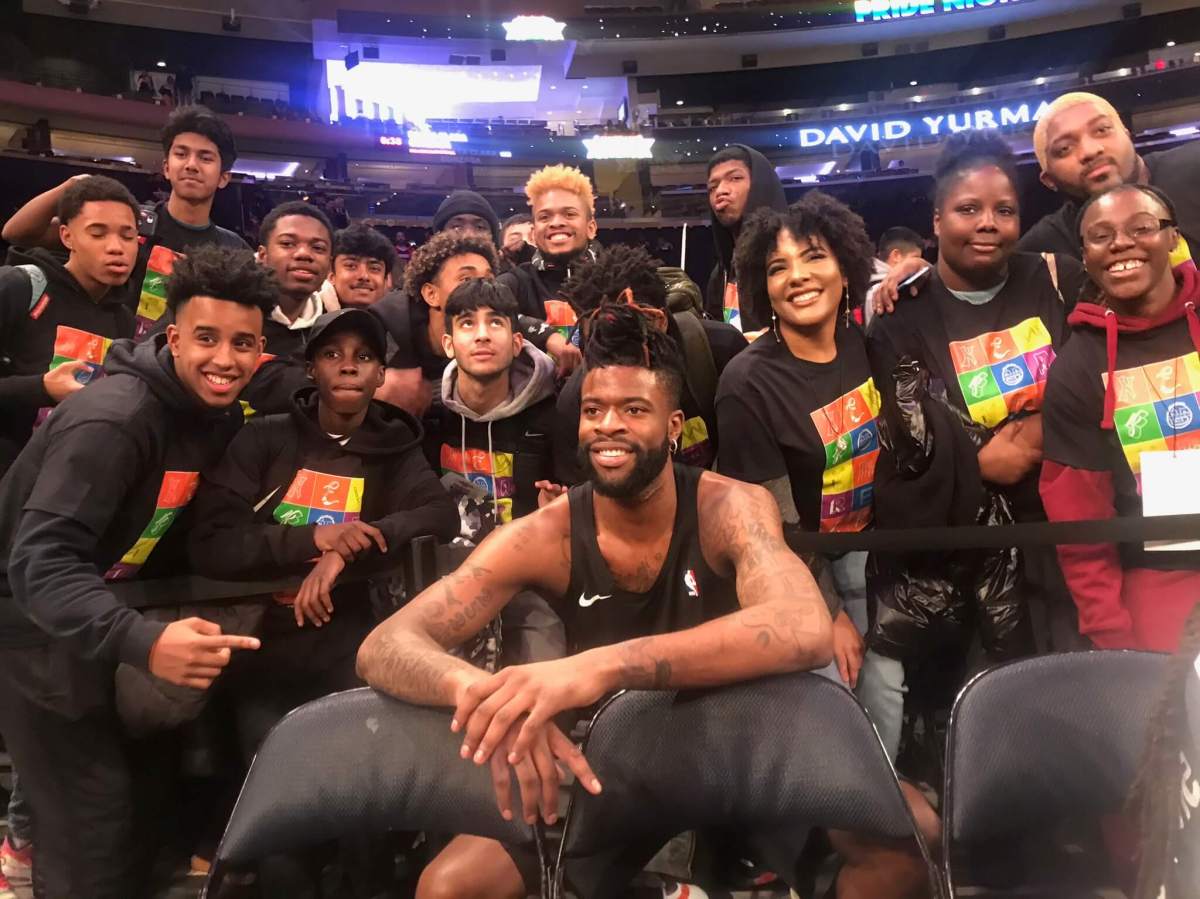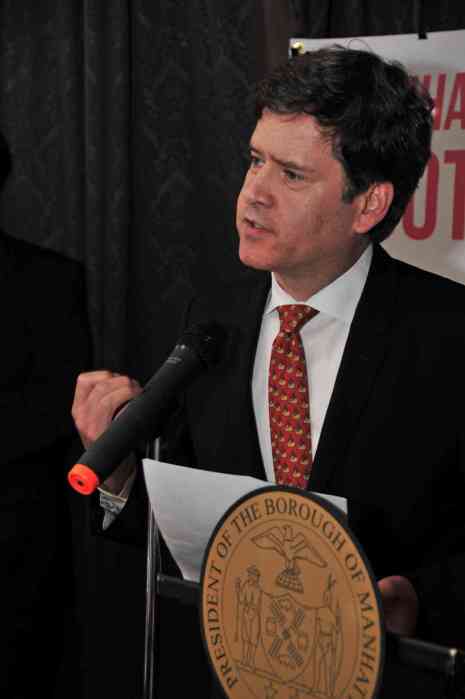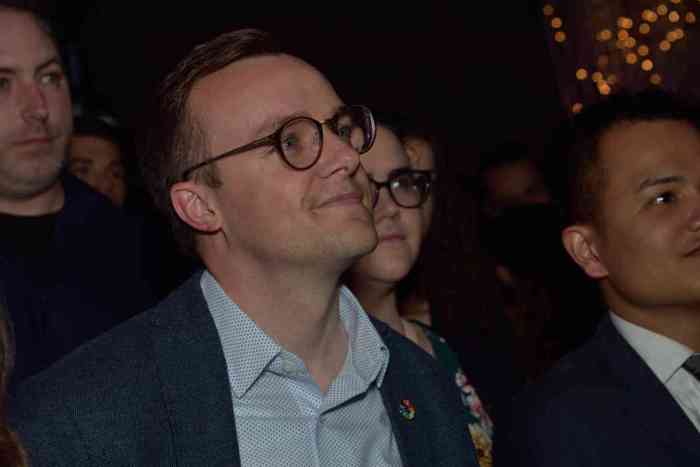It was a rare sight to see — at least in NBA circles — when Reggie Bullock of the New York Knicks emerged from the team locker room on Pride Night and walked on the court at Madison Square Garden with Rainbow sneakers and Rainbow-dyed streaks in his hair.
But it was by no means a surprise.
The 6-foot-6, 205-pound 28-year-old has matched his towering presence on the basketball court with dedicated activism for LGBTQ causes off the court in the years since his transgender sister, Mia, was tragically murdered. Bullock made a mark in the city’s queer community even before he joined the Knicks this past off-season, having been part of the NBA’s contingent in New York’s LGBTQ Pride March in years past as well as turning out for events hosted by organizations like GLAAD. But since moving to New York, he has quickly established himself as a reliable straight ally in the local community.
Most recently, Bullock’s work has included visiting and speaking with students involved with the Hetrick-Martin Institute, which serves LGBTQ youth, and he helped them design Rainbow T-shirts that he and the kids wore on Pride Night January 15 when the Knicks faced the Phoenix Suns.
“The kids designed the actual letters, and I told them my sister’s story,” Bullock told Gay City News at the entrance of the Knicks’ locker room on Pride Night. “I heard different stories of different kids and some kids who hadn’t come out yet and don’t know how to tell their parents. All in all, it was a great time. There is nothing better than to talk and interact with those kids.”
No kidding. Bullock’s face lit up with a smile during pre-game warm-ups when he greeted those same youth and exchanged pleasantries with Hudson Taylor, the founding head of the LGBTQ sports advocacy group Athlete Ally, before he stepped onto the court and swished shot after shot alongside his Knicks teammates. “Pride Night” was emblazoned on the stadium jumbotron and rainbows were perched on video boards in all directions.
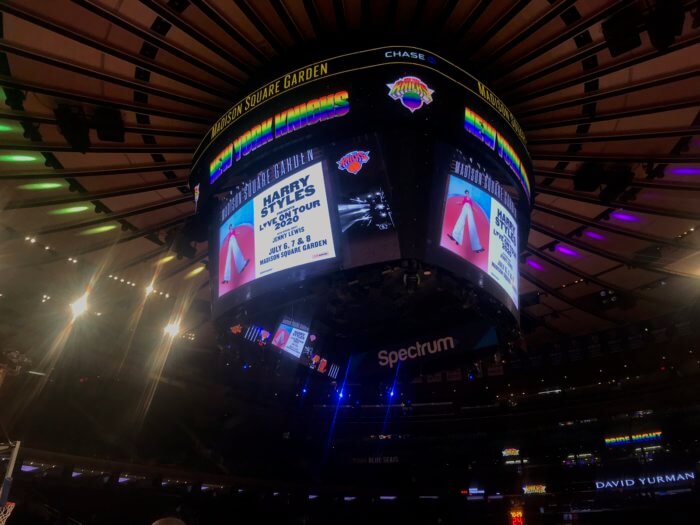
The evening held special significance for Bullock because he has endured a rough journey in recent years: Five years after he lost Mia, tragedy struck yet again this past October when his other sister, Keiosha, was fatally stabbed. He keeps his siblings close to his heart on and off the court by channeling his grief into positive change in society.
“Obviously something tragic happened to me,” Bullock said. “I stand up for the whole LGBTQ community. I want to continue using my platform to stand up for all those all over the world who are fighting for equality on a daily basis. That’s what I’m about and that’s what my sister believed in.”
Bullock’s work with Hetrick-Martin and other organizations is apparently making a difference in NBA locker rooms, which have lacked any out players since Jason Collins — the first out gay NBA player — retired in November of 2014. Bullock said his teammates have been supportive of his work on LGBTQ causes, which is refreshing to hear for queer sports fans, who are left wondering when the hyper-masculine sports world would ever welcome another out player in the NBA.
“I had some teammates actually wear the T-shirts to the game today,” Bullock said. “Looking back to several years ago, I never thought I would be doing this — and it’s going great so far. I’ve been getting great feedback from players all over the league.”
Bullock was unable to play in the Pride game due to a neck injury and he has missed some time this season, but he has averaged 9.9 points, 1.5 rebounds, and 1.5 assists per game through his first eight games with the Knicks. He started last season with the Detroit Pistons before he was traded to the Los Angeles Lakers, where his teammates included superstar LeBron James.
Although Bullock is still new to the Knicks, it wasn’t his first taste of Pride Night. He notably played a major role in leading a Pride Night for the Detroit Pistons during the 2017-2018 season. By that point, he already had a tattoo that read “LGBTQ” in honor of his slain sister.
Now, in a new environment, Bullock participated in Pride festivities with a different team in a different city — and, to their credit, the Knicks put on a very front-and-center show with a spotlight on the LGBTQ community throughout the evening. Within the first half alone, the New York City Gay Men’s Chorus performed the national anthem, facts about New York City LGBTQ history flashed across stadium TVs during timeouts, and out gay State Assemblymember Daniel O’Donnell presented a community leadership award to Destination Tomorrow, a Bronx LGBTQ community center, and its executive director, Sean Coleman. An out member of the military was also recognized.
At halftime, the youth from Hetrick-Martin played in a basketball game on the court and elicited loud cheers from the MSG faithful. The team, dubbed Soldiers of Diversity as part of a sports program at Hetrick-Martin, consists of youth of different sexual orientations, gender identities, races, and backgrounds. The halftime game represented a warming moment on a special night of celebrating New York’s boundless diversity.
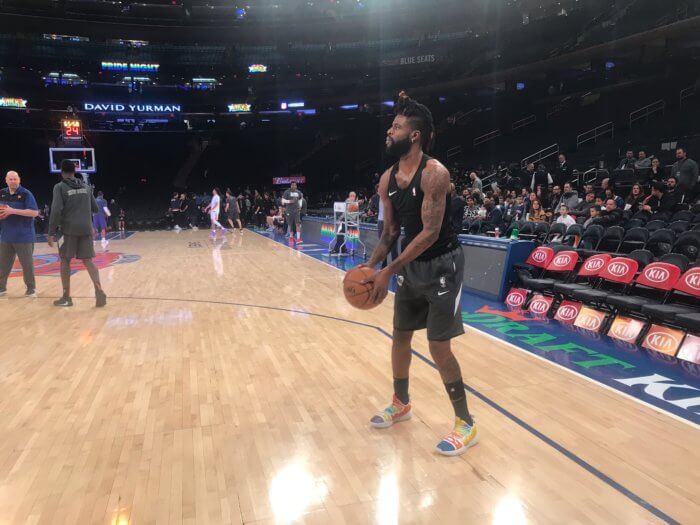
Bullock, meanwhile, is planning to continue pushing for queer rights well into the future. And though he hopes to make an impact far beyond the professional sports world, he is well aware that much work remains in his own workplace. He is at least framing that thought in an optimistic mindset — perhaps because he’s confident that he and others can help foster a more inclusive atmosphere.
“Obviously we don’t have an out player in our league, but with players like me who continue to stand up and use my platform, possibly one day somebody who is a part of the community can be in this league,” he said.
Of course, Bullock will carry the memory of his sisters along with him every step of the way. They were and still are with him, even in remembrance, so much so that he hopes fans in the future will look back at his tenure in the NBA and recall the impact he made off the court as much as his time on the court.
“[Mia] was a part of the community, she believed in everybody, she wanted everything to be equal, she was a regular person, and that’s what she stood for,” Bullock said. “I try to carry it over [with me]. It’s part of who I am and it’s a part of the legacy I want to leave behind.”

